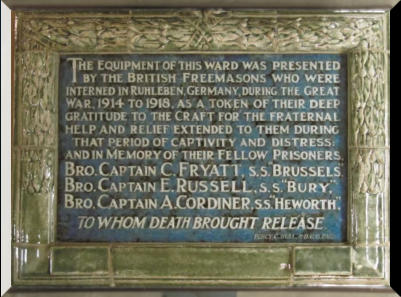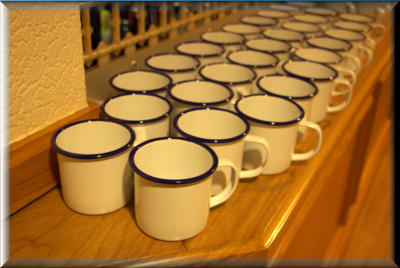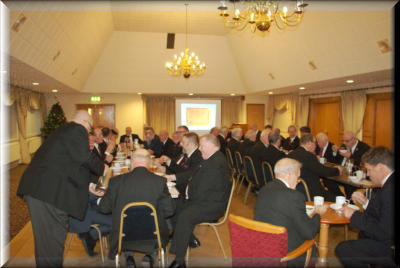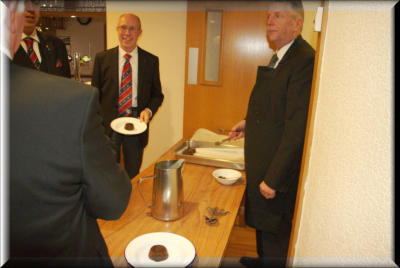


© Palatine Lodge - 1893 - 2023 - In se ipso totus teres -
At this point in the evenings celebrations, it seemed appropriate to mention the menu for our evening
meal which was modelled on the food available in camp. A 1/3 pint of beer for every man was provided
and we combined the very best of the contents of the food parcels with the pick of the vegetables that
were grown at Ruhleben.
The menu was as follows:
To start, the ever-popular cabbage soup followed by a mouth-watering corned beef hash with vegetables
and then, the food parcels have been plundered again to provide every man here with a portion of
Christmas pudding with custard. Tea or coffee will follow with condensed milk for those who want it. A
show of hands was requested to the question, ‘Have you brought bowls, mugs and a spoon’. Of course not,
was the reply..…. Well our guests were in exactly the same position as most of the men arriving at the
Camp and, like them, they were able to buy a brand new bowl and mug in the food queue, to be kept and
taken home as a reminder of the evening. We didn’t sell them at a fixed price, as they were donated, but
rather requested a donation that was to be given to charity.
There is actually no evidence that formal masonic meetings were held in any of the detention camps in Germany during the First World War. What we do know, however, is that
Freemasons made a point of identifying each other and they would hold social gatherings and provide fraternal support for fellow Masons. On 18th December 1914, an address reached
the Grand Secretary in London, it had been sent from Ruhleben on 9th December, only about a month
after the prisoners were first interned in the Camp and read as follows:
'We, the undersigned brethren, at present interned with other British civilians at the
concentration camp at Ruhleben, Spandau, Germany, send hearty good wishes to the Grand Master,
officers and brethren in Great Britain, hoping that we may have the pleasure soon of greeting them
personally'. It was written by Walter Goodale of Freedom Lodge, No.77, Gravesend - which is still in
existence - and was signed by 112 Freemasons. On the 28th December, it was reprinted in the Times of
London. The Address was read out in Grand Lodge and the Grand Secretary sent a copy to all the Lodges
that were involved with a covering letter in which he said 'amongst these names you will observe a
member of your Lodge of whom the brethren will be interested to hear. Perhaps you will kindly acquaint
the families of such members of the communication, of which I shall be pleased to send them a copy'.
The following February, Bro. Goodale sent another letter with the names of a further 45
Freemasons who had not been included on the first list because they had either not yet arrived at the camp or had not been identified as Masons. The two lists identified not only English,
Scottish and Irish Masons but members of Lodges from other parts of the world. In August 1915, another of the internees, W. Bro Percy Hull, wrote to Grand Lodge to advise that there
were now over 200 Freemasons interned in the camp and that approx. 170 were in 'very reduced
circumstances as they receive few parcels from England and any help that Grand Lodge may extend would
be most opportune'. The Grand Master is reported as saying "those poor people, they have lost their
liberty and they have lost their livelihoods. We must do something". Percy Hull's letter helped to launch a
well-publicised campaign to support the internees. The Board of General Purposes sent an appeal to
Lodges, on behalf of Brethren interned in enemy countries as civilian prisoners of war but particularly
those at Ruhleben. It actually became known as the Ruhleben Fund and enabled regular parcels to be sent
to each Masonic prisoner.
There is a record in the Minutes of Palatine Lodge that, at our meeting in November
1915, a formal motion was passed that a sum of two guineas should be donated to the fund. Grand Lodge
approached Sir Richard Burbridge, the Managing Director of Harrods - who else? - for assistance and
parcels were sent which were described as a 'box of good cheer" One beneficiary later reported in the Old
Masonian's Gazette that the parcels contained, amongst other things, tea, coffee, cake, biscuits, corned
beef and oats. To ensure fairness the Masons at Ruhleben kept very careful records of those members
who were entitled to receive parcels and Grand Lodge were informed of any who were repatriated under an exchange system. Those returning prisoners said that their life in the camp
would have been considerably more difficult without the generous support of British Lodges. By December 1915, more than £6,700.00 had been donated to the Ruhleben Fund which is
the equivalent of about £250,000.00 today.
In 1917, Percy Hull organised the Freemasons at Ruhleben, this time to send a beautifully prepared
Address, again signed by all the brethren, which extended fraternal greetings to the Grand Master on the
occasion of the bi- centenary of the formation of Grand Lodge. This was also copied and circulated. It is
gratifying to report, brethren that the charity that was extended to the Freemasons at Ruhleben did not all
flow in one direction. There was a large ceramic plaque which was displayed in a ward in The Royal Masonic
Hospital and can now be seen in the library and museum at Great Queen Street which reads as follows:
'The equipment of this ward was presented by the British Freemasons who were interned in Ruhleben,
Germany during the Great War, 1914 to 1918, as a token of their deep gratitude to the Craft for the
fraternal help and relief extended to them during that period of captivity and distress: and in memory of
their fellow prisoners, Bro Captain C.Fryatt, ss Brussels, Bro Captain E.Russell, ss Bury Bro Captain A
Cordiner ss Heworth To whom death brought release'. Edward Russel was a member of the Earl of
Yarborough Lodge, No. 2770 in Grimsby and he died of natural causes, in the camp, in December 1917.
Alexander Cordiner was a member of St Hilda's Lodge, No 240 in South Shields. He was at Ruhleben from
the beginning and died in March 1918.
Cabbage Soup





















